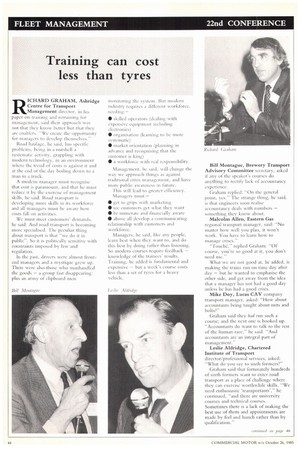Training can cost less than tyres
Page 46

If you've noticed an error in this article please click here to report it so we can fix it.
R!CHARD GRAHAM, Ashridge Centre for Transport Management director, in his paper on training and retraining for
in said their approach was not that they know better but that they are enablers. "We create the opportunity for managers to develop themselves."
Road haulage, he said, has specific: problems, being in a nutshell a
systematic activity, grappling with modern technology, in an environment where the trend of costs is against it and at the end of the day boiling down to a man in a truck.
A modern manager must recognise that cost is paramount, and that he must reduce it by the exercise of management skills, he said. Road transport is developing more skills in its workforce and all managers must be aware how costs fall on activities.
We must meet CUStOnlerti• demands, he said. And road transport is becoming more specialised. The peculiar thing about transport is that "we do it in public". So it is politically sensitive with constraints imposed by law and
regulation.
hi the past, drivers were almost frontend managers and a mystique grew up. There were also those who manhandled the goods — a group fast disappearing: plus an army of clipboard men
monitoring the system. But modern industry requires a different workforce. needing:—
• skilled operators (dealing with expensive equipment including electronics) • organisation (learning to be more systematic) • market orientation (planning in advance and recognising, that the customer is king)
• a workforce with real responsibility.
Management, he said, will change the way we approach things as against traditional crisis management, and have more public awareness in future.
This will lead to greater efficiency.
Managers must:— • get to grips with marketing • see customers get what they want • be numerate and financially aware • above all develop a communicating relationship with customers and workforce.
Managers, he said, like any people, learn best when they want to, and do this best by doing rather than listening. So modern courses require feedback — knowledge of the trainees' results. Training,, he added is fundameimil and expensive — but a week's course costs less than a set of tyres for a heavy vehicle.
Bill Montague, Brewery Transport Advisory Committee secretary, asked if any of the speaker's courses do anything to rectify lack of accountancy experience.
Graham replied: "On the general point, yes." The strange thing, he said, is that engineers soon realise accountancy deals with numbers — something they know about.
Malcolm Allen, Eastern Gas regional transport manager, said: "No matter how well you plan, it won't work. You have to learn how to manage crises."
"Touch," replied Graham. "Of course, you're so good at it, you don't need me."
What we are not good at, he added, is making the trains run on time day after day — but he wanted to emphasise the other side, and get away from the idea that a manager has not had a good day unless he has had a good crisis.
Mike Doy, Lucas CAV company transport manager, asked: "How about accountants being taught about nuts and bolts?"
Graham said they had run such a course; and the next one is booked up. "Accountants do want to talk to the rest of the human race," he said. "And accountants are an integral part of management."
Leslie Aldridge, Chartered Institute of Transport director/professional services, asked: "What do you say to sixth formers?"
Graham said that fortunately hundreds of sixth formers want CO enter road transport as a place of challenge where they can exercise worthwhile skills. "We need enthusiastic Vansportants'," he continued, "and there are university courses and technical courses. Sometimes there is a lack of making the best use of them and appointments are made by feel and hunch rather than by qualification."








































































































